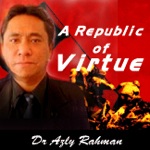MALAYSIA: A collapsing grand narrative

Have Malaysians failed to examine their lives, borrowing the Socratic maxim “the unexamined life is not worth living”? Are we summoning our greatest enemy – ignorance – to lead us to the path of developmentalism and putting knowledge in front of the firing squad circa Merdeka/Independence, borrowing again another Socratic maxim “the greatest enemy of knowledge is ignorance”?
A REPUBLIC OF VIRTUE
Dr Azly Rahman
We see no respect for the rule of law, an increasing gap between the rich and the poor, conspicuous consumption at the highest level of vulgarity, a continuing massacre of the voice of critical sensibility, a direction-less educational progress, production of public statements championing racial and religious bigotry, prostitutionalisation of the electoral process, drunkenness of politicians in attacking pluralists and multiculturalists, fear and trembling upon hearing the words “socialism” and “communism” – all these are indicators of the chaos Malaysians are experiencing in their attempt to understand where their leaders are taking them and why this nation is being torn apart.
Has Malaysia made a wrong turn in conceptualising its economic, social, and political policies, merely transplanting a system left by the colonials?
Have we nurtured a culture that ensures the continuation of a system of exploitation adorned with a façade of nationalism and patriotism derived from the much contested ideology of ketuanan Melayu that is fast losing its force of populism and gaining an image of neo-colonialist Sartrean nausea offering a “no-exit” route to a collapsing grand narrative of an Asian despotic form of deformed developmentalism?
Why are we experiencing this phenomenon? Why are our elected officials becoming corrupted to the core – both in the way they use power and the way they display the image of being in power?
What has crept cancerously into the cognitive faculties/thinking process of our leaders in these five decade of unilinear developmentalist agenda that necessitates such a brutal image of arrogance in the way the leaders react to the voices of discontent as in the Bersih rally and in investigations on corrupt practices?
Have Malaysians failed to examine their lives, borrowing the Socratic maxim “the unexamined life is not worth living”? Are we summoning our greatest enemy – ignorance – to lead us to the path of developmentalism and putting knowledge in front of the firing squad circa Merdeka/Independence, borrowing again another Socratic maxim “the greatest enemy of knowledge is ignorance”?
I suppose we have installed rulers who are not philosophers. We continue to install exploiters and abusers of power that use the ideological state apparatuses to allow a certain paradigm of human and material development to reign supreme. We have installed robber barons who speak with a two-pronged tongue of national development; skilled users of Orwellian doublespeak.
What we have is now, after over 50 years of independence, are a broken education system; a population that does not read books that help in the improvement of the soul, mind, and spirit; a ruling regime that is holding its last dying breath by chanting the mantra of racial and religious bigotry in the hope that it can continue to live in luxury for the next decade or so.
A philosophically dead society
We have a philosophically dead society by those who could not even see the need to look at society through the lens of political economy but rather see the bastardised version of specialised functions of governance as the only way to run society as a political entity.
We need to groom philosopher-rulers – not as an elitist Platonic or Confucian type of ruling elitism, but to create the everyday philosopher-ruler in our project of grooming future leaders in virtually all sectors of our lives.
We need to reconceptualise the way we run our universities and public institutions in the training of the mind to lead organisations. We need to help members of society understand what knowledge is, its origin, its transformative power, and how it should be applied for the good of those that are potentially marginalised, alienated, or even mentally enslaved in newer and more subtle ways.
Through education conceived differently to meet the needs of a degenerating society, members of society need to be taught how to analyse complex social, ethical, technological, and social issues in this post-industrial and informational age and offer scientific ideas to effect humanistic and social change in virtually all sectors of human intellectual-macro level activities.
To save this nation from total destruction, we must go back to philosophy and through a rigorous curriculum adaptable to varying contexts of learning, teach our future leaders the following:
- To understand the nature of knowledge and the history of its conceptualisation.
- To understand the differences between knowledge, information, understanding, application, and able to articulate how these conceptions differ from one another.
- To utilise the understanding of the philosophical, cultural, and political-economic aspects of knowledge as a basis to create newer and synthesised understanding of these and craft frameworks to offer perspectives to social and moral problems.
- To develop logical, creative, moral, and futuristic ideas for social and organisational change; ideas informed by the deep rooted and broad-based understanding of knowledge in the most inter-disciplinary and cross-cultural sense of the word.
- To develop a set of cognitive skills to be recognised as effective, respectable, well-informed, philosophically-trained members of a think-tank group of social organisations and social frontier thinkers able to generate innovative solutions to complex problems.
- To explore varying cultural philosophies and draw universal themes of ethics and social reconstructionism to affect changes that will benefit the poor, marginalised, and alienated of all ethnic groups.

